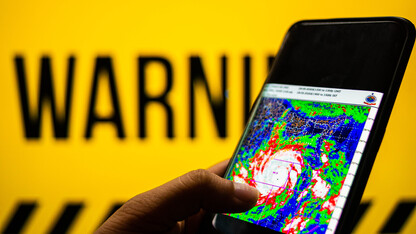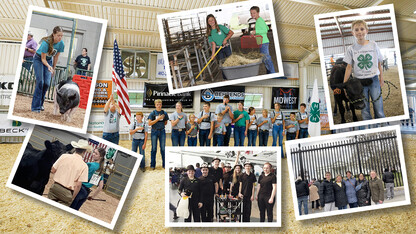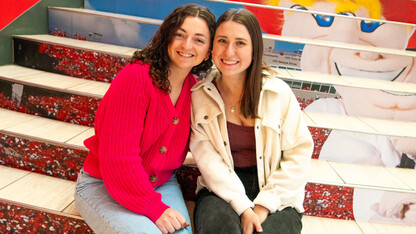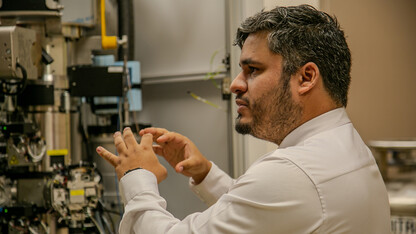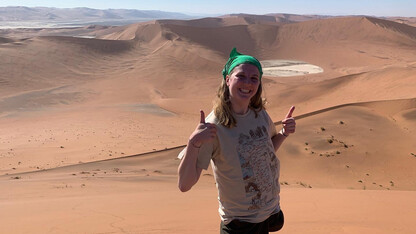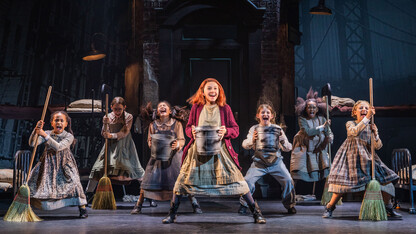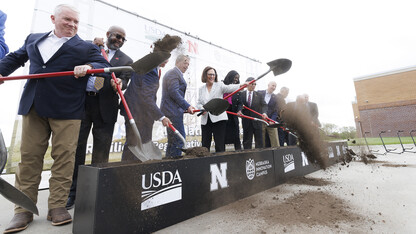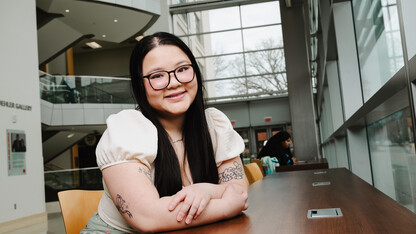· 6 min read
Dispatch team protects, supports university police
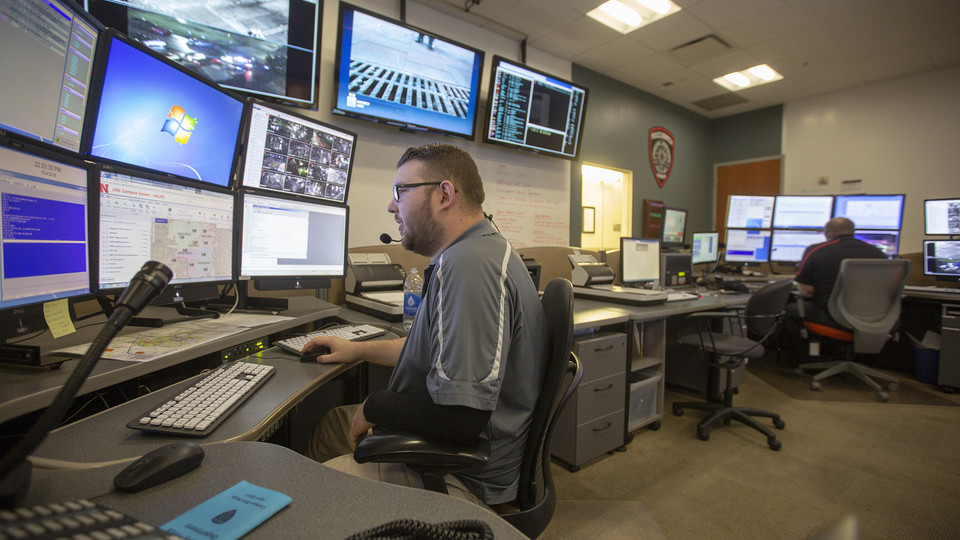
It’s 10:27 p.m. in University Police Department dispatch and the damp chill of early fall is ushering forth a slow Thursday night.
“Sure is quiet,” said Zach Fischer, a third-year law enforcement dispatcher who spent the previous 90-ish minutes primarily supporting UPD officers through a handful of minor traffic stops.
“Oh, snap,” said Jonathan Genter, a dispatcher working a station that responds to phone calls and life safety alarms on campus. “You had to drop the ‘Q’ word.”
“Some of us don’t like that word because it means we’re going to be busy,” Fischer said. “But, I like it. It means the night might get interesting.”
This is week three of six in the University Police Department’s Citizens’ Police Academy and the focus is on Nebraska’s dispatch team. Organized by University Police, the inaugural academy is designed to educate student, faculty and staff volunteers about law enforcement activities on campus.
The program includes an opportunity to conduct a sit-along in UPD dispatch. My shift starts at 9 p.m. Oct. 4 and rolls to 1 a.m. Oct. 5.
Dispatch 101
The University Police Department dispatch team includes 12 dispatchers and three staff assistants. Like University of Nebraska–Lincoln police, dispatchers are on duty 24 hours a day, dividing the work into three shifts.
Led by Megan Witherspoon, director of communications and support, the team is rounded out by a staff assistant and public safety systems specialist.
Nebraska has a pair of dispatch locations, including the primary center at UPD offices in the 17th and Q streets parking garage. A back-up center is in Memorial Stadium and doubles as the primary location on Husker football game days.
Whichever is in use, both locations are full-service dispatch centers, working 911 calls transferred from the Lincoln Emergency Communications Center, dispatching officers as needed, answering phone calls to University Police, and operating with other first responders.
While working with UPD officers on routine patrols, the Nebraska dispatch center responds to, on average, nearly 800 calls and more than 1,000 security checks every month.
“We are often unseen, operating behind scenes as the eyes and ears of the police department,” Witherspoon said. “Our primary responsibility is to provide necessary information and support to assist our officers in the field.”
The team is also unique in that it processes police records (including citations and reports); manages lost property, digital evidence and the UPD’s uniform and equipment needs.
UPD dispatchers are also well trained, with a minimum of 112 hours of classroom instruction to start and at least 24 hours of continuing education each year. Four of Nebraska’s dispatchers have received emergency medical dispatcher certification, an achievement earned by just nine dispatchers across Nebraska and about 1,200 nationwide.
Tools of the trade
Minutes after calling the night “quiet,” Fischer assists an officer with a traffic stop made after a vehicle ventures the wrong way down Q Street.
As Fischer enters information about the driver and vehicle into local and national databases, Conradt dials up one of the more than 2,300 security cameras on campus and focuses on the traffic stop near 19th and Q streets. A minute later, a second car rolls by, going the wrong way down the street.
Fischer alerts officers to the vehicle, but — before they can respond — the driver realizes the mistake and turns down another road.
“We have a number of tools available to help our officers,” Fischer said. “Our goal is to get them accurate information as fast as possible. We’re trained to get it to them in under a minute — though it can be longer for more in depth records.”
Overall, dispatches have access to 29 applications to assist UPD officers. Those include records that range from university systems to and international database ran by Interpol.
It’s shortly before 11:30 p.m. and the campus camera system is about to become the most important tool of the shift.
“I love that this job is never the same twice. There’s always some different call or scenario to assist with. To me that’s fun.”
Zach Fischer, UPD dispatcher
While assisting with another minor traffic stop, Fischer eyes a strange shape in a video feed from a residence hall elevator. He clicks the video and watches as a group of students stumble and sway into an elevator. Two fall, one having to be picked up and assisted into the elevator.
Fischer calls for officers to respond to see if the students are OK.
“That’s the reason we watch the elevator cameras,” Fischer said. “One or maybe more of those students is intoxicated and needs assistance before something bad happens.”
Officers are on scene two minutes later and find the group in a hallway. By 11:45 p.m., one student is taken into protective custody and four citations for underage drinking are issued.
“We are actively watching numerous cameras on campus during our shifts,” said Spencer Conradt, a third-shift supervisor and dispatcher. “Sometimes we catch things — like (Fischer) once caught someone stealing a car in a garage — but it doesn’t happen often.
“It’s just luck of the draw to have it happen tonight.”
Minutes before the 1 a.m. finish of my sit-along — after multiple vehicle stops, report of a suspicious person and smoke alarm generated by a burned pizza — luck strikes again.
Eyeing strange motion in a small corner of a screen filled with 16 security camera feeds, Fischer enlarges a single video. There, a car slowly rolls across the top of the 17th and R streets parking garage — home to the University Police — and parks.
“There should not be a car on top of this garage at this time,” Fischer said. “Why would you park there if it’s rainy and there are tons of spaces on other levels?”
As Fischer zooms in on the car, a flame sparks in front of a passenger. In his call to alert officers, Fischer outlines his suspicions — lighter, possibly narcotics, likely marijuana.
Two UPD officer teams respond, approaching the vehicle from different directions. When the car doors open, smoke appears on the screen, floating out of the car.
“Between the smoke and, most likely, the smell, that’s probable cause for a search,” Fischer said.
After a little banter, Conradt congratulates Fischer and the two go back to work helping officers identify the individuals in the car atop the garage and at more traffic stops.
“I love that this job is never the same twice,” Fischer said. “There’s always some different call or scenario to assist with. To me that’s fun.”
And, like the rest of Nebraska’s dispatch team, Fischer and Conradt love being part of the system that protects and serves the campus community.
“We may not know what each night is going to hold, but we know what our mission is,” Conradt said. “And, there’s no better feeling than ending a shift knowing that your work has helped others and also helped officers go home safely.”

